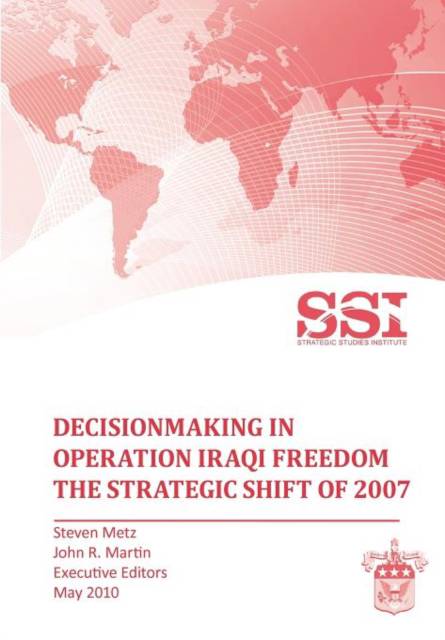
Je cadeautjes zeker op tijd in huis hebben voor de feestdagen? Kom langs in onze winkels en vind het perfecte geschenk!
- Afhalen na 1 uur in een winkel met voorraad
- Gratis thuislevering in België vanaf € 30
- Ruim aanbod met 7 miljoen producten
Je cadeautjes zeker op tijd in huis hebben voor de feestdagen? Kom langs in onze winkels en vind het perfecte geschenk!
- Afhalen na 1 uur in een winkel met voorraad
- Gratis thuislevering in België vanaf € 30
- Ruim aanbod met 7 miljoen producten
Zoeken
Decisionmaking in Operation IRAQI FREEDOM
Removing Saddam Hussein by Force
Stephen Metz, John R Martin, Strategic Studies Institute
Paperback | Engels
€ 24,45
+ 48 punten
Omschrijving
In 1946, General Walter Bedell Smith wrote a series of articles describing six great decisions made in World War II by General Dwight David Eisenhower Writing so soon after the war, General Smith could not hope to produce a definitive history, but felt that writing then would document an important viewpoint of one of the major participants in Eisenhower's many significant decisions. With this initial volume of their Operation IRAQI FREEDOM Key Decisions Monograph Series, the Strategic Studies Institute also attempts to write about key decisions while they are still fresh in the memories of the participants. This series will not produce a definitive history, however, it will make a major contribution to understanding decisions made by senior military and civilian leaders during the several years thus far of the war in Iraq. Looking more at the how and why of certain decisions than at the results of those same decisions, this series will be particularly useful to senior leaders--both uniformed and civilian--as they reflect on how decisions were made in Iraq and how better decisions might be made in future conflicts. As General James Mattis at Joint Forces Command recently said, the challenges of operating in a counterinsurgency can be greater than in large-scale conventional combat, "since the adversary has more flexibility to determine how, when, where, and whether to fight." This, plus the fact that irregular combat is the more likely challenge of the future operating environment, makes it even more important to examine the key decisions of Operation IRAQI FREEDOM as soon as possible. One of the greatest strengths of our Army over the centuries has been its ability to look critically at itself and to devise ways to improve its ability to prosecute the Nation's wars.
Specificaties
Betrokkenen
- Auteur(s):
- Uitgeverij:
Inhoud
- Aantal bladzijden:
- 94
- Taal:
- Engels
Eigenschappen
- Productcode (EAN):
- 9781780395203
- Verschijningsdatum:
- 22/03/2010
- Uitvoering:
- Paperback
- Formaat:
- Trade paperback (VS)
- Afmetingen:
- 170 mm x 244 mm
- Gewicht:
- 163 g

Alleen bij Standaard Boekhandel
+ 48 punten op je klantenkaart van Standaard Boekhandel
Beoordelingen
We publiceren alleen reviews die voldoen aan de voorwaarden voor reviews. Bekijk onze voorwaarden voor reviews.









